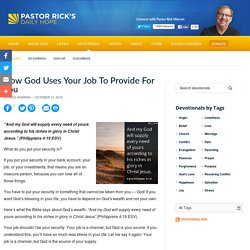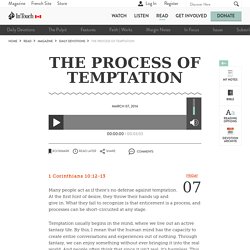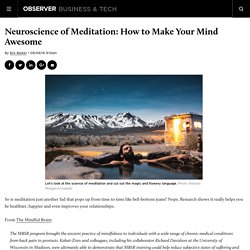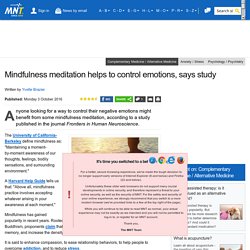

How God Uses Your Job To Provide For You. By Rick Warren — October 13, 2015 “And my God will supply every need of yours according to his riches in glory in Christ Jesus.”

The Process of Temptation. In Touch Ministries makes reasonable and customary efforts, in accordance with the highest ministry and communications industry standards, to preserve your privacy, and the security of any information you may choose to transmit to us.

Because no communication made by means of the global Internet can be guaranteed to be 100% secure, and because as described below In Touch Ministries may be legally required to disclose your personal information and/or notes under some limited circumstances, you understand and agree that In Touch Ministries cannot and does not guarantee the perpetual security of your personal information and/or notes. Meditation for Beginners: 20 Practical Tips for Understanding the Mind. By Leo Babauta The most important habit I’ve formed in the last 10 years of forming habits is meditation.
Hands down, bar none. Meditation has helped me to form all my other habits, it’s helped me to become more peaceful, more focused, less worried about discomfort, more appreciative and attentive to everything in my life. I’m far from perfect, but it has helped me come a long way. Probably most importantly, it has helped me understand my own mind. So … I highly recommend this habit. These tips aren’t aimed at helping you to become an expert … they should help you get started and keep going.
Sit for just two minutes. Meditation isn’t always easy or even peaceful. If you’d like help with mindfulness, check out my new Zen Habits Beginner’s Guide to Mindfulness short ebook. Neuroscience Of Meditation: How To Make Your Mind Awesome. Let’s look at the science of meditation and cut out the magic and flowery language.

Photo: Robson Morgan/Unsplash So is meditation just another fad that pops up from time to time like bell-bottom jeans? Nope. Research shows it really helps you be healthier, happier and even improves your relationships. From The Mindful Brain: The MBSR program brought the ancient practice of mindfulness to individuals with a wide range of chronic medical conditions from back pain to psoriasis.
And it’s not some magical mumbo-jumbo at odds with the science of psychology. From Thoughts Without A Thinker: While lecturing at Harvard in the early 1900s, James suddenly stopped when he recognized a visiting Buddhist monk from Sri Lanka in his audience. Last week I posted about the neuroscience of mindfulness. But Lefty screws up sometimes. Mindfulness meditation helps to control emotions, says study. Studies suggest that mindfulness meditation can help to regulate the emotions.

The University of California-Berkeley define mindfulness as: "Maintaining a moment-by-moment awareness of our thoughts, feelings, bodily sensations, and surrounding environment. " A Harvard Help Guide tells us that: "Above all, mindfulness practice involves accepting whatever arising in your awareness at each moment. " Mindfulness has gained popularity in recent years. Rooted in religious practice and prayer, and especially in Buddhism, proponents claim that it can benefit the immune system, improve attention and memory, and increase the density of gray matter in the brain. It is said to enhance compassion, to ease relationship behaviors, to help people to overcome addiction, and to reduce stress. The search for neural associations that underlie mindfulness.
Philadelphia Man Exonerated After 25 Years in Prison Says Meditation, Family, Faith Helped Him Behind Bars - ABC News. When Tony Wright walked out of the prison where he had spent 25 years of his life for a brutal crime he didn’t commit, he raised his hands in a sign of victory, grateful to be free.

“God is good, God is good, God is good,” he said, surrounded by his family and his lawyers. This past August, a Philadelphia jury acquitted Wright of the 1991 rape and murder of a 77-year-old woman. He had been just 20 years old when he was arrested -- a father with a young son and a full-time construction job. When he found himself in handcuffs, Wright said he felt “numb” and couldn’t stop crying. “My whole body shut down,” he said. He said Philadelphia police questioned him about the crime and a detective came in with papers for him to sign. “I wanted to look at the papers and see what I was signing,” Wright said. The papers contained a detailed confession, written in longhand by the detective. WOULD YOU RATHER.... Then where does the ULTIMATE PEACE really come from? IMAGE BOARD.